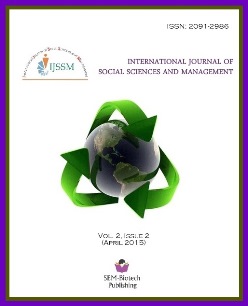Analysing the Effectiveness of Different Women Stakeholder Selection Procedures towards Adoption in a Remote District of India
DOI:
https://doi.org/10.3126/ijssm.v2i2.12472Keywords:
Panchayat selection, women stakeholder, self-help group selection, farmer’s club selection, farm and home visit selection, effectiveness analysis, training need assessmentAbstract
Realising the very need of women empowerment and development, the present study has been undertaken to explore the efficiency of different women stakeholder selection processes namely through panchayat, farm and home visit, self-help group and farmer’s club with respect to adoption of innovation. The study was conducted in five villages of Coochbehar-II block of Coochbehar district in West Bengal. Purposive as well as multistage and random sampling procedure were followed in the present study. The adoption percentage was considered as the response variable and the other attributes of women stakeholders were considered as the antecedent variables for the study. The data were collected with the help of structured schedule through personal interview method. The statistical methods used for the analysis of the data were frequency, percentage, ranking and t-test. In the present study, it was found that variation in age is responsible for a significant variation among the women stakeholders selected by panchayat and farm and home visit. Likewise, the attribute education accounts for a significant difference among the women stakeholders selected by panchayat and farm and home visit, also among the women stakeholders selected through panchayat and self-help group as well as among those selected by farm and home visit and farmer’s club. In case of women stakeholders’ caste, the significant mean differences are observed in case of panchayat and farm and home visit selection processes, panchayat and farmer’s club selection processes, farm and home visit and self-help group selection processes and farm and home visit and farmer’s club selection processes. A significant mean difference is also observed, on the basis of women stakeholders’ occupation, in between panchayat and farmer’s club selection processes. Almost similar type of significant differences among the four different women stakeholder selection processes are evidenced in case of selected women stakeholders’ family size, annual income, house type, animal size, attitude towards adoption, risk orientation, training need assessed and adoption percentage. A significant difference is also revealed in case of women stakeholders’ farm size selected by self-help group and farmer’s club. It is also found from the present study that women stakeholder selection process through self-help group is much more effective than other selection procedures being studied in case of adopting an innovation. In search of the training need of the women stakeholders, the most preferred areas of training by the women stakeholders were scientific orchard management, followed by floriculture, improved poultry and duckery breed rearing, cattle feed rearing, tailoring and pisciculture.
DOI: http://dx.doi.org/10.3126/ijssm.v2i2.12472
Int. J. Soc. Sci. Manage. Vol-2, issue-2: 180-183
Downloads
Downloads
Published
How to Cite
Issue
Section
License
This license enables reusers to distribute, remix, adapt, and build upon the material in any medium or format for noncommercial purposes only, and only so long as attribution is given to the creator.




